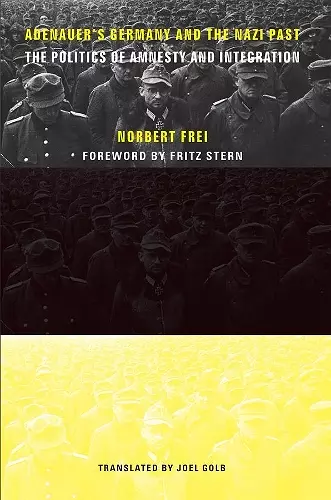Adenauer's Germany and the Nazi Past
The Politics of Amnesty and Integration
Norbert Frei author Joel Golb translator
Format:Hardback
Publisher:Columbia University Press
Published:27th Sep '02
Currently unavailable, and unfortunately no date known when it will be back

Frei chronicles the denazification process in Adenauer's 1950s Germany. The stopping of punishment for Nazi crimes formed the crux of a policitcs of the past which, to a large degree, revoked the consequences of the previous political expurgation.
Of all the aspects of recovery in postwar Germany perhaps none was as critical or as complicated as the matter of dealing with Nazi criminals, and, more broadly, with the Nazi past. While on the international stage German officials spoke with contrition of their nation's burden of guilt, at home questions of responsibility and retribution were not so clear. In this masterful examination of Germany under Adenauer, Norbert Frei shows that, beginning in 1949, the West German government dramatically reversed the denazification policies of the immediate postwar period and initiated a new "Vergangenheitspolitik," or "policy for the past," which has had enormous consequences reaching into the present. Adenauer's Germany and the Nazi Past chronicles how amnesty laws for Nazi officials were passed unanimously and civil servants who had been dismissed in 1945 were reinstated liberally-and how a massive popular outcry led to the release of war criminals who had been condemned by the Allies. These measures and movements represented more than just the rehabilitation of particular individuals. Frei argues that the amnesty process delegitimized the previous political expurgation administered by the Allies and, on a deeper level, served to satisfy the collective psychic needs of a society longing for a clean break with the unparalleled political and moral catastrophe it had undergone in the 1940s. Thus the era of Adenauer devolved into a scandal-ridden period of reintegration at any cost. Frei's work brilliantly and chillingly explores how the collective will of the German people, expressed through mass allegiance to new consensus-oriented democratic parties, cast off responsibility for the horrors of the war and Holocaust, effectively silencing engagement with the enormities of the Nazi past.
Frei has done a great service in documenting the depth and the breadth of indigenous West German opposition to bringing the criminals of the Nazi era to justice and to forcing compromised elites out of positions of responsibility in the crucial early years... His case is impressive. New Republic No one has written better. This is an important work: very well researched, reflective, sharp in judgment yet alive to complexity... Frei's conclusions are alert to the moral and political complexity of our times. -- David Blackbourn London Review of Books The value of this book, which makes for bitter but important reading, rests on the close analysis of sources in the dialectical process of constructing a democracy after 1945. Frankfurter Allgemeine Zeitung The merit of Frei's work lies in the thorough historical investigation of three important aspects of political dealing with the Nazi past--achieving an original scholarly contribution that expands and deepens our historical knowledge, and one that cannot be overlooked. Die Zeit A painstakingly researched analysis of the early Adenauer era. Norbert Frei takes a hard look at the political, judicial and intellectual consequences of the emerging amnestysizing 'policy of the past' and disapproves. The Washington Times Frei's intense use of primary soures will appeal to specialists familiar with the intricacies of postwar German politics. Choice This thorough piece of research throws much light on the west German side of de-Nazification and the profound contrast to measures taken by the Allies. Foreign Affairs Frei's excellent study deserves to be read by anyone interested in the problem of how societies attempting the transition from dictatorship to democracy face - or do not face - a troubled past. Nations and Nationalism Hailed as 'groundbreaking' and major[,]' [t]he German edition has been cited extensively in the literature since 1996. The power of the work lies not merely in the clear explication of the events... but also in Frei's balanced analysis of the positive and negative repercussions of the Federal Republic's 'policy for the past.' -- Jay Lockenour American Historical Review Frei puts an end to the polemical debate over the putative silences in the official political rhetoric of the 1950s by examining in exceptional detail exactly who said what, when, where, and why. -- Jeffrey K. Olick Ethics and International Affairs This is a fascinating book about how West Germany spent the first years of its life undoing what had been done to overcome the legacy of Nazism. -- Bill Niven Holocaust and Genocide Studies
ISBN: 9780231118828
Dimensions: unknown
Weight: unknown
365 pages